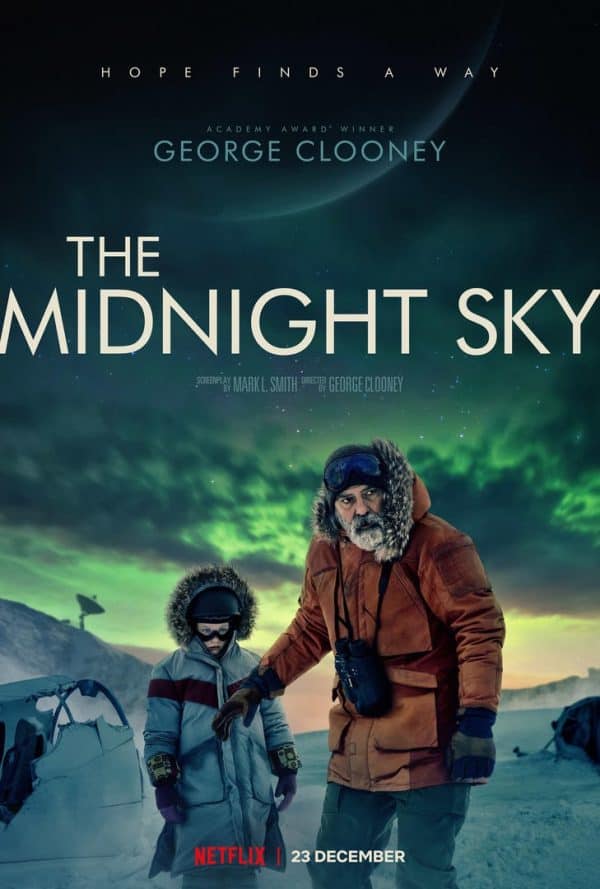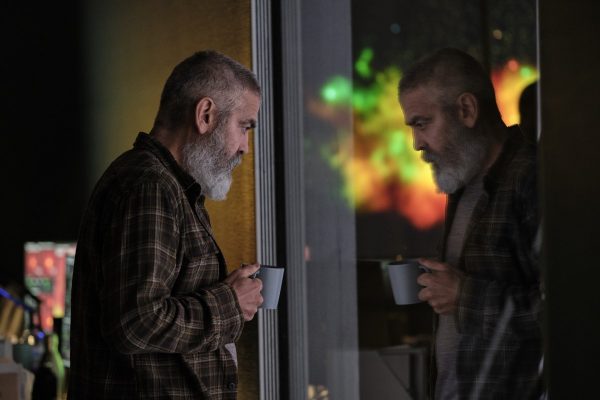The Midnight Sky, 2020.
Directed by George Clooney.
Starring George Clooney, Felicity Jones, Kyle Chandler, Demián Bichir, David Oyelowo, Tiffany Boone, Caoilinn Springall, Sophie Rundle, and Ethan Peck.
SYNOPSIS:
A lone scientist in the Arctic races to contact a crew of astronauts returning home to a mysterious global catastrophe.
Those hoping that Netflix were set to wrap up 2020 by throwing yet another awards-chasing hat into the ring may be left a little deflated by George Clooney’s The Midnight Sky, an enticingly glossy and respectably ambitious sci-fi thriller that nevertheless feels like a jigsaw puzzle with a few pieces too many.
Clooney pulls multi-hyphenate duty as director-producer-star in this adaptation of Lily Brooks-Dalton’s novel Good Morning, Midnight, where he plays grizzle-faced, cancer-ridden scientist Augustine Lofthouse, who ekes out the solitary remainder of his life at an abandoned Arctic observatory.
The year is 2049, and a nondescript global calamity has rendered Earth virtually extinct, though Augustine soon finds himself joined by a young, mostly nonverbal girl, Iris (Caoilinn Springall), who has stowed away at the observatory.
When Augustine learns that a NASA spaceship, the Aether, is imminently due to return to Earth from Jupiter, he attempts to warn Commander Gordon Adewole (David Oyelowo) and his pregnant partner Sully (Felicity Jones) against revisiting their uninhabitable home planet.

It’s a killer concept, and to Clooney’s absolute credit he acquits himself well here where filmmaking plaudits are concerned. The first reel in particular is an appealingly chilly slow-burn, focused on a sluggish, fed up Augustine dragging himself around the observatory and slowly revealing cracks in his armour per his interactions with Iris.
Early comparisons to The Road are inevitable and earned, and for a time it feels like Clooney may well have delivered a truly daring $100 million movie; a high-concept, small-scale sci-fi survival thriller.
But “human interest” sadly rears its head when the story detours to focus on the Aether’s crew who, despite counting characters played by decorated actors such as Oyelowo, Jones, Demián Bichir, and Kyle Chandler, rarely graduate beyond mere plot-motivating props.
Each of the crew members has their own generically melodramatic impetus for either returning to Earth or avoiding it entirely, and the script from Mark L. Smith (The Revenant, The Hitman’s Bodyguard) largely lets this pass for character development. Yet we get only slatted glimpses of who the Aether’s crew really are as human beings, beyond neon-signposted touchstones that feel suggested by studio notes (even though, this being Netflix, that’s less-likely).

And so, the bulk of the latter two acts pinball the audience relentlessly between these dramatic halves, Augustine’s broken down grump proving so much more interesting than those he’s actually charged with saving.
Though the result of this lopsided dramatic presentation is a 122-minute runtime which occasionally tests the patience, the sheer majesty and confidence of Clooney’s direction does ensure The Midnight Sky remains generally interesting enough.
If Clooney has mostly steered away from effects-heavy fare as a filmmaker, here he lavishes in it and proves himself quite adept at juggling the toils of a large-scale production. The visuals, from the luscious, plausibly futuristic production design from regular Clooney collab Jim Bissell to the superlative visual effects and Martin Ruhe’s (The American) sharp cinematography, combine to ensure practically every scene pops with aesthetic intrigue.
But the glue holding these elements together isn’t so much Clooney the filmmaker but Clooney the actor, who clearly relishes the opportunity to “ugly” himself up and play a battered hunk of human meat. It’s a role he’s perfect for, especially at this stage in his life – a little more wrinkled, yet still enviably varnished – and even though it’s a shame he isn’t the more singular focus, without him the more contrived emotional aspects wouldn’t work nearly so well.

Clooney’s co-conspirator in this regard is Alexandre Desplat, who delivers one of his best scores of recent years, and one which could certainly net him an Academy Award nomination. It’s an unapologetically snotty-nosed, heart-swelling score which perfectly compliments the film’s emotional beats, even if the bones of Smith’s script don’t always let them land. Meanwhile in the more viscerally fraught sequences, Desplat’s operatic score elevates the relatively boilerplate action shenanigans.
What may ultimately disappoint some is the payoff to Augustine’s story, which is hinged on a dramatic ploy many will find excessively convoluted – and many more may find simply predictable. A syrupy final sting in the dramatic tail underlines that Clooney hasn’t quite found a way to marry the bleaker survival narrative of the first act with a more macro-scale tale of protectorship that neither sticks nor earns its landing.
Again, Clooney gets an A-for-effort as both director and actor, and the ensemble cast does the best with the material they have – especially Jones and Oyelowo – but the home stretch is conceited enough to feel like it was an off-cut from an entirely different movie. Still, if you’re able to accept its patent unevenness, there is a mostly interesting genre jaunt to be enjoyed here, albeit not the home-run many were doubtless hoping for as the cinematic calendar draws to a close.
George Clooney’s first foray into big-budget genre fare is just successful enough to overcome its numerous dramatic shortcomings – largely due to his impressive two-hander as filmmaker-star.
Flickering Myth Rating – Film: ★ ★ ★ / Movie: ★ ★ ★
Shaun Munro – Follow me on Twitter for more film rambling.











